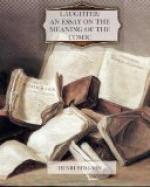But, above all, there is a special madness that is peculiar to dreams. There are certain special contradictions so natural to the imagination of a dreamer, and so absurd to the reason of a man wide-awake, that it would be impossible to give a full and correct idea of their nature to anyone who had not experienced them. We allude to the strange fusion that a dream often effects between two persons who henceforth form only one and yet remain distinct. Generally one of these is the dreamer himself. He feels he has not ceased to be what he is; yet he has become someone else. He is himself, and not himself. He hears himself speak and sees himself act, but he feels that some other “he” has borrowed his body and stolen his voice. Or perhaps he is conscious of speaking and acting as usual, but he speaks of himself as a stranger with whom he has nothing in common; he has stepped out of his own self. Does it not seem as though we found this same extraordinary confusion in many a comic scene? I am not speaking of Amphitryon, in which play the confusion is perhaps suggested to the mind of the spectator, though the bulk of the comic effect proceeds rather from what we have already called a “reciprocal interference of two series.” I am speaking of the extravagant and comic reasonings in which we really meet with this confusion in its pure form, though it requires some looking into to pick it out. For instance, listen to Mark Twain’s replies to the reporter who called to interview him:
Question. Isn’t that a brother of yours? Answer. Oh! yes, yes, yes! Now you remind me of it, that was a brother of mine. That’s William--Bill we called him. Poor old Bill!
Q. Why? Is he dead, then? A. Ah! well, I suppose so. We never could tell. There was a great mystery about it.
Q. That is sad, very sad. He disappeared, then? A. Well, yes, in a sort of general way. We buried him.
Q. Buried him! Buried him, without knowing whether he was dead or not? A. Oh no! Not that. He was dead enough.
Q. Well, I confess that I can’t understand this. If you buried him, and you knew he was dead—A. No! no! We only thought he was.
Q. Oh, I see! He came to life again? A. I bet he didn’t.
Q. Well, I never heard anything like this. Somebody was dead. Somebody was buried. Now, where was the mystery? A. Ah! that’s just it! That’s it exactly. You see, we were twins,—defunct and I,—and we got mixed in the bath-tub when we were only two weeks old, and one of us was drowned. But we didn’t know which. Some think it was Bill. Some think it was me.
Q. Well, that is remarkable. What do you think? A. Goodness knows! I would give whole worlds to know. This solemn, this awful tragedy has cast a gloom over my whole life. But I will tell you a secret now, which I have never revealed to any creature before. One of us had a peculiar mark,—a large mole on the back of his left hand: that was me. That child was the one that was drowned! ... etc., etc.




